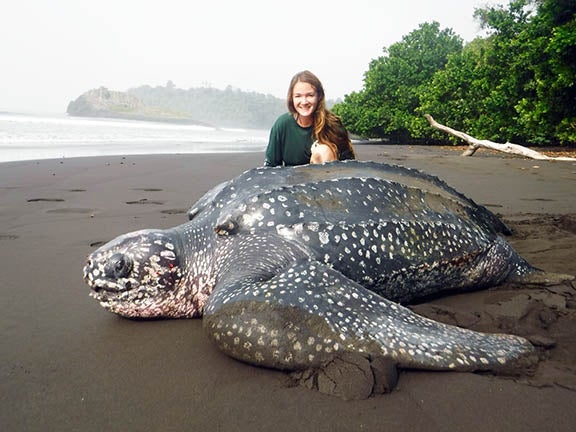URI Marine Biology program celebrates 25th anniversary
 |
| Callie Veelenturf and friend (Photo courtesy of Callie Veelenturf) |
The 25th anniversary of the establishment of the University of Rhode Island’s Marine Biology Program will be celebrated Nov. 5 with the first Dr. Stanley Cobb Lecture, a presentation on sea turtle conservation by URI alumna Callee Veelenturf.
The
free program will begin at 4 p.m. in the URI Center for Biotechnology and Life
Sciences and will be followed by a reception. The program will also be
broadcast via Zoom. To register, contact Ann Weston in the URI Alumni
Engagement Office at annweston@uri.edu.
Veelenturf’s lecture is entitled “Making a Difference for Nature, One Sea Turtle at a Time.” She is the founder and executive director of the Leatherback Project, a non-profit organization dedicated to the conservation of the leatherback turtle through research, education, and advocacy activities aimed at mitigating fisheries bycatch, reducing plastic pollution and combating climate change.
Her
advocacy for sea turtle conservation has received the attention of the
government of Panama with which she has recently worked to write key
legislation that would recognize the rights of nature.
The URI Marine Biology Program, from which Veelenturf graduated in 2014,
attracts top students from dozens of states and from other countries each year
to experience what the faculty call its “sea of opportunities.” It has become a
top draw for those interested in marine science and has earned a reputation as
one of the most prestigious marine biology programs in the Northeast.
“Our Marine Biology Program is a destination major,” said Professor Jacqueline Webb, the George and Barbara Young Chair in Biology and director of the program. “It’s what draws students to the University, and its popularity is mostly developed through word of mouth.”
The program was founded in 1996 after URI’s zoology and biology departments were merged and Professor Stanley Cobb and colleagues recognized a need for a degree program in marine biology.
After Cobb’s retirement, Webb took over
managing the program in 2006. The program’s website, web.uri.edu/marbio,
outlines the many opportunities students have to become immersed in marine
biology activities, from ship-based courses and internships to research around
the country and study-abroad opportunities in Bermuda and elsewhere around the
world.
Each year for the last 11 years, at least one sophomore marine biology major has been awarded a Hollings Scholarship from the National Oceanic and Atmospheric Administration, the most prestigious undergraduate scholarship for students studying marine science.
Since 2005, 33 URI students have won Hollings
Scholarships, the highest total of any institution in New England and one of
the highest among four-year public institutions in the country.
“In the last 15 years, we’ve had a 99 percent satisfaction rate among
our graduating seniors,” Webb said. “They say they’d do it again if they had
the chance.”
Graduates of the Marine Biology Program have gone on to earn graduate degrees
at more than 50 universities around the country and several overseas. Most of
those who don’t immediately pursue further education get jobs at aquariums or
zoos, work as federal fisheries observers, become teachers or laboratory
technicians, or work for non-profit environmental organizations upon
graduation. Numerous alumni also work for state and federal wildlife and
environmental agencies.
The celebration of the program’s 25th anniversary
began last spring with a series of themed panel discussions with notable
graduates offering career insights for current students. This anniversary and
the Cobb Marine Biology Lecture will serve as the kickoff of a renewed effort
to raise funds for the Cobb Marine Biology Endowment, which provides support for
undergraduate research in marine biology.
For more information about the Marine Biology Program, visit the program’s
website or write to urimbio@etal.uri.edu.